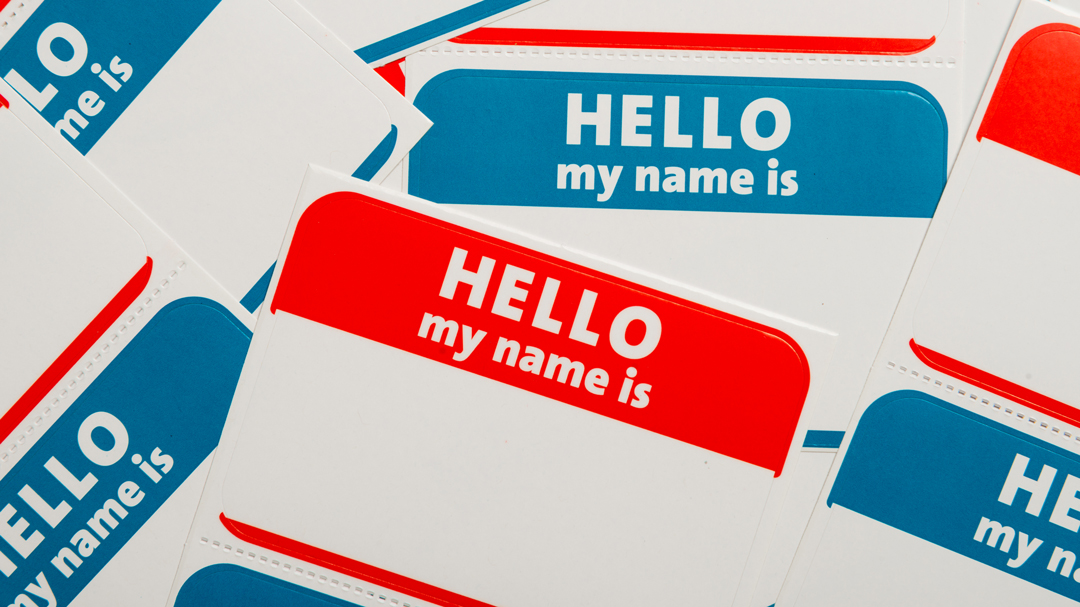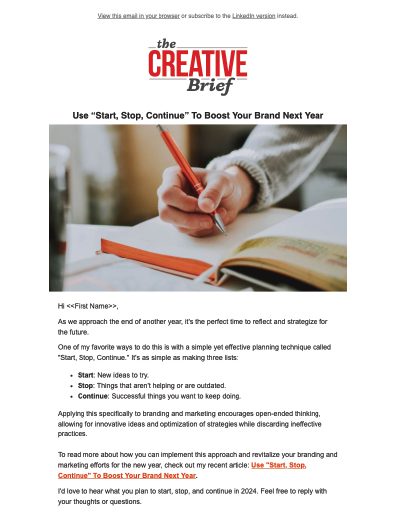To remind us that names have only as much power as we give them, Juliet in Shakespeare’s Romeo and Juliet says (and I’m paraphrasing), “Would not a rose by any other name smell just as sweet”?
Um, no. Shakespeare obviously didn’t have to worry about branding.
Naming is an integral part of branding. A name triggers an idea in the minds of consumers about the quality of service or product. Your company name leaves as much of an impression as your logo, your business card, or any other visual that we could create.
The wrong name can send the wrong message, or worse, confuse people about what you do. And you don’t get a second chance to make a first impression. The question is, do you want your first impression with your primary audience to be something that’s interesting and helps tell your story? Or do you want something that sounds like many others, an industry or category norm, but consequently has less impact because it blends in with the rest? That might be a strategic choice but often not the one most desired.
So what’s in a name? Everything, when it comes to your brand. A great brand name is a crucial element for brand success. So why do many companies neglect to place enough emphasis on this vital ingredient of their branding strategy? Naming is not emotion or politics; instead, it’s all about strategic rationale. If it’s safe or comfortable, it’s going to be forgettable too.
The importance of a great name
A great name is a short easy-to-communicate piece of information. It can grab people’s attention and make them want to know more. Ideally, it communicates one key objective that is firmly founded on your brand promise, positioning, values, and tailored to fit with your core customer mindset. If it’s effective, your brand name will also be memorable and carry a significant portion of brand recognition all on its own.
On the other hand, a forgettable brand name forces you to work harder to keep your brand top of mind with customers.
The Psychology and Semiotics of Naming
The best brand names aren’t just clever, they’re felt. Sounds and structures carry subconscious meaning that can influence how your audience perceives your brand. Hard consonants like “K” or “X” often convey speed, strength, or innovation (think Kodak or Xerox), while softer syllables may feel calming or luxurious (Luna, Olay). Even syllable count matters—shorter names often feel more modern and tech-forward, while longer names may feel more traditional or corporate.
Semiotics plays a role here, too. Certain prefixes, roots, and cultural associations can evoke specific ideas or emotional responses, even if we don’t consciously realize it. For example, names ending in “-ify” (Spotify, Shopify) suggest action or transformation. Understanding the psychology behind phonetics and symbolism can give your brand name an added layer of resonance and staying power.
Understanding the Different Types of Brand Names
Brand naming should not be a haphazard or random process. It’s an equally systematic, holistic, and creative process driven by precise brand positioning and marketing objectives. Avoid the temptation to choose your name subjectively and rigorously benchmark against your agreed criteria during the creative process.
To choose a great brand name, you need first to be familiar with the many styles of names and decide on the type that conceptually matches your company, products and services, and your target audience.
As a starting place for your brand naming process, here are ten name types to get you started.
1. Founders’ Names: One of the simplest types of brand names, this can also sometimes be difficult to use effectively. This style uses the name of the person who founded the company as the brand, with or without further qualifiers that describe the products. Disney, named after founder Walt Disney, is one of the most famous examples of this.
2. Descriptive Names: Another straightforward brand naming convention, this style uses names that describe the products or services offered. One example of this is Whole Foods.
One thing to note with this type of name is that sometimes the names that describe a product become synonymous with the product itself – such as Xerox for copy machines, Band-Aid for elastic bandages, and Kleenex for tissues. In this case, your brand name, and protected trademark, become generic and represent the entire category.
These types or brand names are almost victims of their success and have to fight against becoming generic. Whenever we say we want to search for something online, we say ‘I’ll Google it,’ which is now the generic term for web search! When a brand name becomes so commonly used, it can lose its value. In worse case scenarios, it can also lose its legal protections!
3. Geographic Names: Once again, this simple naming convention is what it sounds like – the use of a region or landmark associated with a product or service in a brand name, e.g., Patagonia. Global tech company Cisco Systems, Inc., draws its name from a shortened version of the company headquarters’ location in San Francisco.
4. Personification: These brand names are centered around either a real or mythical person who is not the founder, and may not even be associated with the company. Personification brand names may use historical figures, legends, or may create a brand personality around a fictitious company mascot – such as Aunt Jemima or Betty Crocker.
5. Evocative Names: This type of brand name paints a vivid and relevant image for the customer, e.g., The Body Shop, Amazon.
6. Alliteration or Rhyming Names: This category includes names that are both memorable and fun to say, e.g., YouTube, Piggly Wiggly. Dunkin’ Donuts uses alliteration and a shortened word to create a rhythmic and easy to remember the brand name.
7. Derivative Names: This category includes names that are almost like something you’ve heard but have been changed to sound a little different, e.g., Nespresso, Zappos. It can be one of the most creative ways to create a name that is unique and is very reflective of more contemporary naming trends and can be easier to register, protect and buy the relevant URL legally.
8. Neologisms (new made-up words): Some brands use completely made-up new words, which creates a sense of uniqueness and infuses lasting qualities with the brand that helps to set it apart from the competition. Examples here include Kodak and Twitter. Neologist brand names, when appropriately developed, can be among the most powerful brand naming strategies and like Derivative names, easier to register and protect. However, they typically require more initial marketing resources to become highly recognized and given meaning through the branding strategy.
9. Hybrid Names: This category refers to brand names like Swissair, ThinkPad, Microsoft, Swisscom, and Nice and Easy. All are combinations of current words or recognized syllables, which, when combined, send the right message and potentially highlight attributes and benefits relating to the brand. This form of naming can deliver very creative and memorable results, too, and like Derivative and Neologist Names are less likely to infringe on other trademarks.
10. Acronyms and Initials: This category refers to brand names that stand for something longer, such as KFC for Kentucky Fried Chicken, HP for Hewlett-Packard, GE for General Electric. Names BMW for Bavarian Motor Works and FedEx for Federal Express only became acronyms after each brand had made its mark in the world. They’ve typically rebranded when the long name version no longer served its purpose as effectively, e.g., it was so well known and well established in the marketplace, and customers were shortening it colloquially because it was too wordy!
Note: Initial or acronym brand names typically work best for companies that are well known or large corporations and have already established a brand under their full names, and shortening the names won’t impact their existing brand equity. Most brands should avoid this type of naming as it effectively amounts to a meaningless mix of letters, leaving the customer confused and indifferent.
Brand naming can also combine several of these conventions to arrive at a distinctive and powerful name. IKEA is an excellent example of this. On the surface, IKEA is a neologism, a made-up word that’s easy to remember, and it’s also fun to say. But looking into the origin of the company name, it’s an acronym for the founder’s name and the Swedish property and village where he grew up: Ingvar Kamprad Elmtaryd Agunnaryd.
Rebrands and Renaming Considerations
There comes a point when a business outgrows its name, whether because of a pivot, expansion, merger, or simply because the original name no longer reflects the brand’s identity. A renaming effort isn’t just cosmetic, it’s a strategic reset that must be approached with care.
The biggest considerations? Equity, clarity, and risk. If your current name holds brand equity, think carefully before walking away from it entirely. On the flip side, if your name is limiting, confusing, or baggage-laden, renaming can be a powerful tool for repositioning. Keep in mind that renaming requires thoughtful communication—both internally and externally—to avoid alienating existing customers or losing recognition.
A successful renaming strategy includes the same rigor as an initial naming effort: grounding in strategy, alignment with future goals, and a clear understanding of your audience and market. Whether you’re starting fresh or evolving an existing brand, the name should move your business forward, not hold it back.




